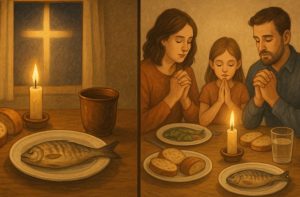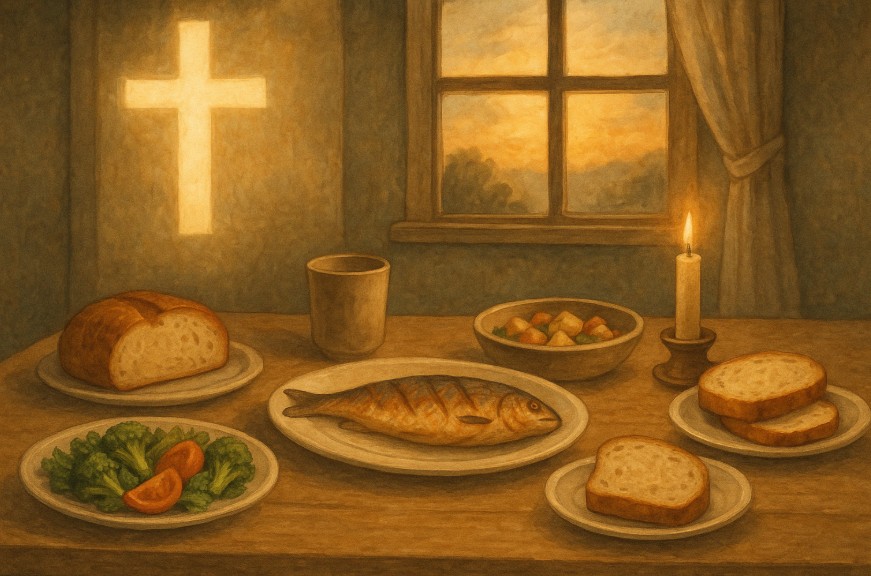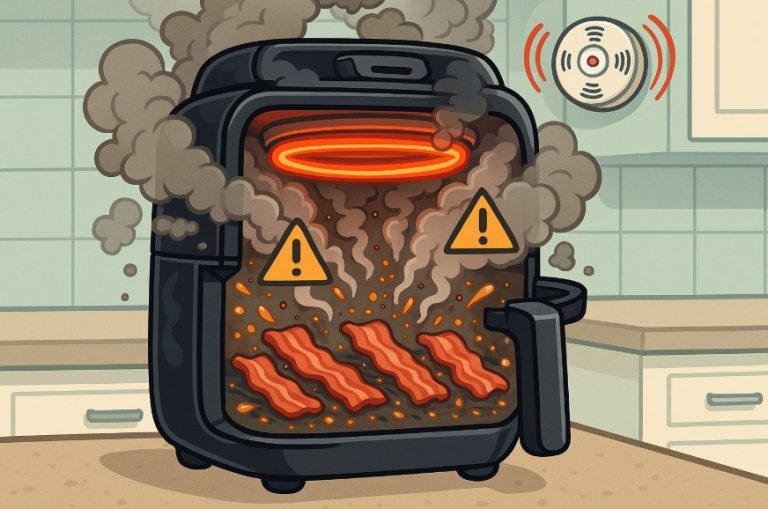Why Can’t You Eat Meat on Good Friday?
Good Friday, the day Christians commemorate the crucifixion of Jesus, is marked by solemn reflection and traditions of self-denial. One of the most recognised customs is abstaining from meat.
But why is meat avoided, and why is fish acceptable? This centuries-old practice is deeply rooted in religious symbolism and spiritual discipline.
Why Is Good Friday Considered So Significant in Christianity?

Good Friday, observed during Holy Week, commemorates the crucifixion and death of Jesus Christ. It is one of the most solemn days in the Christian calendar, marked by reflection, mourning, and penance.
The day symbolises the ultimate sacrifice of Jesus, who, according to Christian belief, gave his life to save humanity from sin.
This observance includes traditional acts of devotion, such as abstinence from meat, a practice tied to centuries of Christian teaching and reflection. But what exactly makes eating meat incompatible with this holy day?
Why Do Christians Traditionally Avoid Meat on Good Friday?
The tradition of avoiding meat on Good Friday stems from ancient Christian practices of penance. From the earliest centuries, followers of Christ have honoured the crucifixion by abstaining from “flesh meat.” This custom, sometimes referred to historically as a “black fast,” reflects Jesus’s sacrifice of his flesh for humanity.
Catholics in particular abstain from flesh meat on days of penance such as Ash Wednesday, Good Friday, and every Friday during Lent. This practice is grounded in Canon Law (Canon 1251), which designates Fridays as days of abstinence in memory of Christ’s crucifixion.
But why meat and not other foods? Flesh meat including beef, pork, chicken, and turkey symbolised celebration and indulgence in earlier times, making it inappropriate for days of sorrow and spiritual reflection.
Fish, on the other hand, was cheaper, more common, and never associated with feasting or festivities, hence its suitability.
Why Is Good Friday Closely Linked to Lent?

Good Friday is not just a standalone observance; it is the culmination of Lent, a season marked by repentance, sacrifice, and spiritual preparation. The Lenten period mirrors Jesus’s 40 days of fasting in the desert and leads believers toward the hope and joy of Easter.
Good Friday, being the most intense moment of sorrow in the Christian calendar, intensifies the call to abstinence. It is a moment to remember not only Christ’s death but also to participate in a small way through physical and spiritual sacrifices such as fasting and meat abstention.
Why Is Fasting Seen as a Form of Spiritual Discipline?
Fasting and abstinence are forms of penanc, tangible acts that express sorrow for wrongdoing, demonstrate a commitment to turn away from sin, and symbolise a return to God.
The Church encourages these practices as ways to make reparation for sins and strengthen one’s spiritual discipline.
Abstinence, in particular, is also a form of asceticism, the practice of self-denial to grow in holiness. Jesus himself instructed his followers to “deny themselves and take up their cross” (Matthew 16:24).
By refraining from flesh meat, Christians seek to honour Christ’s ultimate act of self-denial, giving up his body on the Cross.
Importantly, this form of sacrifice should not be defeated by excess. Replacing a steak dinner with lobster or Alaskan king crab undermines the spirit of simplicity and humility that abstinence seeks to cultivate.
Modest meatless meals like soup and bread, grilled cheese, pancakes, or fish better reflect the intention behind the practice.
Why Is Meat Avoided and Fish Preferred on Good Friday?

The distinction between meat and fish is rooted in both tradition and language. The Latin word caro, from which we get words like “carnivore,” refers specifically to the flesh of warm-blooded animals. It has never included fish, which are cold-blooded aquatic animals.
As a result, fish and other cold-blooded water dwellers such as clams, shrimp, crabs, turtles, and frogs, are permitted during periods of abstinence.
Historically, these foods were not associated with luxury or celebration, making them acceptable choices during fasting periods.
In the past, meat was often expensive and eaten during festive occasions. Abstaining from it signalled both a financial and spiritual sacrifice. In contrast, fish was more widely available and consumed more regularly, fitting better with the spirit of modesty and penance.
Why Do Good Friday Practices Differ in the UK Today?
In contemporary UK society, the tradition of abstaining from meat on Good Friday is still observed by many Christians, especially Catholics and Anglicans.
However, secularism, diverse spiritual interpretations, and changing dietary habits have led to varied observances across communities.
While older generations may strictly avoid meat, younger believers might focus on different forms of sacrifice or charity.
Still, the message remains: Good Friday should be treated as a day of solemn reflection, however one chooses to observe it.
Why Are There Specific Fasting Rules for Good Friday?

The Catholic Church has detailed regulations about fasting and abstinence. On Good Friday, Catholics aged 18 to 59 are expected to fast, meaning one full meal and two smaller meals that do not equal a full meal combined. Additionally, all Catholics aged 14 and older are obliged to abstain from meat, with no upper age limit.
This requirement reflects the seriousness of the day and is not merely about food, it is about participating, even in a small way, in the sacrifice of Christ.
While some individuals are exempt due to age, health, or medical reasons, the spiritual call to reflect and practice penance remains for all.
Why Do Good Friday Traditions Vary Around the World?
Across the globe, Christians commemorate Good Friday in culturally distinct ways. In countries like Spain and the Philippines, public processions and dramatic reenactments of the Passion are common. In Italy, religious observances often include long periods of fasting and prayer.
In contrast, nations like the UK and the US tend to mark the day with church services, quiet reflection, and fasting from meat.
Regardless of the cultural expression, the universal Christian message of sacrifice and love remains central.
Summary of Good Friday Fasting Rules by Denomination
| Denomination | Fasting Required? | Meat Abstinence? | Age Requirements | Exemptions |
| Roman Catholic | Yes | Yes | 18–59 for fasting, 14+ for abstinence | Elderly, sick, pregnant/nursing, children |
| Anglican | Varies | Recommended | None specific | Varies by parish |
| Orthodox | Yes | Yes (more strict) | All ages expected to observe | Medical and pastoral reasons |
| Protestant (General) | Optional | Optional | Not strictly defined | N/A |
| Methodist | Recommended | Optional | N/A | N/A |
Why Does the Practice Remain Relevant Today?

Though society has modernised, the practice of meat abstinence on Good Friday still resonates. It offers believers a chance to step away from indulgence, reflect on the meaning of Christ’s crucifixion, and engage in acts of penance and self-discipline.
Fast food chains offering fish sandwiches during Lent reflect the lasting impact of this tradition. It’s a subtle sign that, even in a commercialised world, spiritual practices still shape public habits and cultural trends.
Whether one follows this tradition strictly or chooses another meaningful form of penance, the goal remains: to honour Christ’s sacrifice and foster personal spiritual growth.
Conclusion
Abstaining from meat on Good Friday isn’t just about dietary rules, it’s a meaningful act of faith. Rooted in tradition and shaped by centuries of Christian practice, it symbolises sacrifice, reflection, and respect for Christ’s crucifixion.
Whether followed strictly or adapted in modern ways, the tradition continues to inspire a deeper connection to spiritual values.
Frequently Asked Questions
What happens if someone eats meat on Good Friday?
In Catholic teaching, this would be considered a disregard for Church discipline unless excused by a serious reason. However, the focus is always on spiritual intention rather than legalism.
Is eating fish on Good Friday just a Catholic thing?
While rooted in Catholic tradition, many Christian denominations have adopted the practice as a form of personal or communal observance.
Are vegetarians already fulfilling the Good Friday rule?
Yes. Those who do not consume meat already meet the requirement, though they may still choose another form of penance.
Why is meat seen as indulgent in Christianity?
Historically, meat was a luxury food linked to celebration, whereas fish was associated with modesty. Giving it up became a symbol of restraint and humility.
How do Orthodox Christians observe Good Friday?
The Orthodox Church often enforces stricter fasting, abstaining not only from meat but also dairy, eggs, and even oil in many traditions.
Do all Christians fast on Good Friday?
No. Practices vary. While fasting is mandatory for Catholics and Orthodox Christians, other denominations offer it as a personal spiritual choice.
Is abstaining from meat a biblical command?
Not directly. The practice is based on tradition and Church authority rather than explicit biblical instruction, though fasting is encouraged in Scripture.







